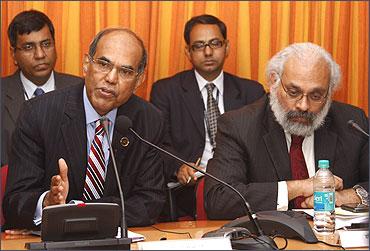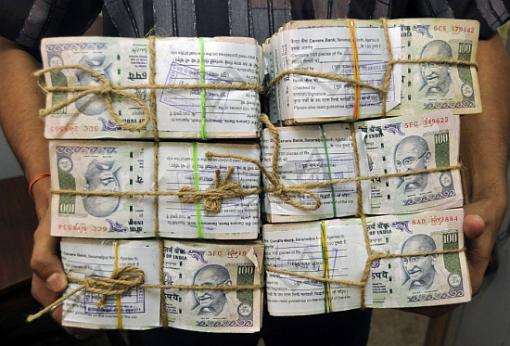Photographs: Sahil Salvi. Subir Gokarn
Viewed pragmatically, the Budget for 2013-14 needed to address the concerns of at least three constituencies.
First, as the last full-fledged Budget before a general election, it had to provide some concrete support for the ruling coalition's election platform.
Second, given the size of the current account deficit, at least in the short run it had to find ways to attract larger and more stable capital inflows.
In this context, the views of the rating agencies are important and, given their emphasis on the fiscal situation, a credible reduction in the fiscal deficit was one -- though not the only -- way of achieving this.
. . .
Speak to experts on Live Chat!
Union Budget, as it unfolded on February 28
Complete coverage: Union Budget 2013-14
Budget Impact Live!
Budget 2013: The impossible trinity?
Photographs: Reuters
Third, the adverse growth-inflation combination that the economy is currently dealing with requires some structural solutions -- for example, with respect to food and infrastructure constraints -- to be implemented with high priority.
Appropriately designed and implemented, these could both directly stimulate growth and help alleviate persistent inflationary pressures over time.
More importantly, they could influence expectations of better macroeconomic prospects.
Was it even possible to present a Budget that could provide a reasonable level of satisfaction to all three constituencies?
In particularly favourable macroeconomic conditions, the answer is yes.
. . .
Speak to experts on Live Chat!
Union Budget, as it unfolded on February 28
Complete coverage: Union Budget 2013-14
Budget Impact Live!
Budget 2013: The impossible trinity?
Photographs: Reuters
The 2008-09 Budget, the last fourth-year exercise, demonstrated that political imperatives could be combined with fiscal rectitude.
The farm loan waiver came along with a fiscal deficit of 2.5 per cent of gross domestic product.
However, this year's Budget was presented in macroeconomic circumstances, both global and domestic, that could not have been contrasted more sharply to 2008.
The room for fiscal manoeuvre is severely constrained, not just in the Indian context, but globally.
These constraints meant that the interests of any constituency could only be promoted at the expense of the others.
. . .
Speak to experts on Live Chat!
Union Budget, as it unfolded on February 28
Complete coverage: Union Budget 2013-14
Budget Impact Live!
Budget 2013: The impossible trinity?
Photographs: Reuters
A balanced Budget would mean one that used whatever limited space there was to pursue the interests of all three constituencies.
In doing so, each of them would perhaps feel a little let down, but not to the point of upsetting the apple cart.
From this perspective, the Budget appears to have achieved that balance.
From the viewpoint of the political constituency, the temptation to announce initiatives with immediate political payoffs but high fiscal costs was clearly resisted.
Instead, an important forward-looking emphasis on skills and employment is a constructive appeal to a voter demographic that will increasingly dominate the political process over the next several years.
. . .
Speak to experts on Live Chat!
Union Budget, as it unfolded on February 28
Complete coverage: Union Budget 2013-14
Budget Impact Live!
Budget 2013: The impossible trinity?
Photographs: Reuters
As regards fiscal control and reassurances to foreign investors on this front, the fiscal deficit is just 0.1 per cent higher than the Budget estimate and significantly lower than many of the forecasts made during the course of the year.
Importantly, the provision for subsidies is relatively small, at least signalling the government's intention to revise prices, notwithstanding the political risk.
Also, the growth in capital expenditure is budgeted to be close to 40 per cent, while revenue expenditure will only grow by about 14 per cent.
On the growth-inflation balance, with regard to food, there are initiatives to encourage crop diversification, more efficient water management and funds provided for technology development.
. . .
Speak to experts on Live Chat!
Union Budget, as it unfolded on February 28
Complete coverage: Union Budget 2013-14
Budget Impact Live!
Budget 2013: The impossible trinity?
On infrastructure, the speech highlighted progress on Infrastructure Development Funds and credit enhancement on the financing side, and the setting up of a regulatory authority for roads on the institutional side.
The investment tax credit also provides an additional stimulus to what has clearly been a growth retardant over the past year.
But, in trying to provide some satisfaction to all the critical constituencies, is the Budget going to end up providing no satisfaction to anyone?
While the focus on skill creation -- both training and certification -- is commendable, its economic and political dividends depend entirely on massive numbers of jobs being created at a pace that absorbs the numbers of people who pass through this new, improved skilling system.
. . .
Speak to experts on Live Chat!
Union Budget, as it unfolded on February 28
Complete coverage: Union Budget 2013-14
Budget Impact Live!
Budget 2013: The impossible trinity?
The record has been unimpressive, and a major constraint with respect to job creation in the manufacturing sector is the still un-reformed job security regulation framework.
The reduction in the fiscal deficit, while not dramatic, is reassuring.
But more finicky analysts will raise concerns about optimistic estimates on revenue collections and disinvestment proceeds, as well as the rollover of subsidies from the current year to the next, not to mention the provision for subsidies.
Expenditure compression is clearly an alternative, as was seen in the current year, but proximity to elections may prove to be a constraint.
. . .
Speak to experts on Live Chat!
Union Budget, as it unfolded on February 28
Complete coverage: Union Budget 2013-14
Budget Impact Live!
Budget 2013: The impossible trinity?
On the growth-inflation balance, questions need to be raised about the effectiveness of delivery.
In 2011, we had a mission on protein supplements.
In 2012, there was a dairy initiative.
This time, there is a livestock mission.
There seems to be very little visibility on the outcomes from the previous two programmes.
The implementation report, which is released along with other Budget documents and reports progress on 81 items from last year, is silent on the dairy initiatives.
If food productivity is to be increased, there needs to be visibility and public scrutiny of these critical programmes.
. . .
Speak to experts on Live Chat!
Union Budget, as it unfolded on February 28
Complete coverage: Union Budget 2013-14
Budget Impact Live!
Budget 2013: The impossible trinity?
Photographs: Jayanta Dey/Reuters
Ultimately, whether the triangular balancing act is achieved or not depends entirely on how the other ministries deliver on their targets.
The space for big-bang actions by the finance ministry that was so effectively utilised through the 1990s has virtually disappeared.
Unfortunately, the burden of expectations that this has created for the ministry hasn't.
Instead of the intense anticipation and scrutiny of the Budget, the economy would perhaps be better served by similar attention to what the other ministries are doing or not doing to deliver on Budget announcements.
The author is the former Deputy Governor, Reserve Bank of India











article